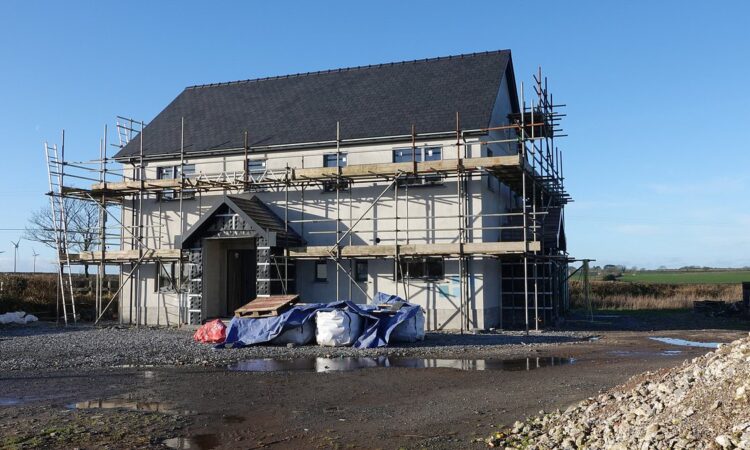Brownfield planning rules shake-up would make it harder to object against new home builds

- Government says every council will need to prioritise brownfield developments
- Experts say changes will apply to all new housing in a town, including its suburbs
- More homes need to be built in the right places, insists housing minister
Objecting to a new homes being built on a garden centre at the end of your road, or stopping your local pub being converted into flats will become more difficult, a planning expert has warned.
Martin Gaine, a chartered town planner, was responding to the Government’s shake up of planning rules to boost the number of homes being built.
He told MailOnline and This is Money that the Government’s announcement will apply to all new housing in a town, including its suburbs – and not just regeneration projects on old industrial land.
Under its proposals, the Government said every council in England will be told that they will need to prioritise brownfield developments.
They will be instructed to be ‘less bureaucratic’ and ‘more flexible’ in applying policies that halt housebuilding on brownfield land.
The Government is consulting on the proposals until March 26 and says it will then look to implement these changes to national planning policy as soon as possible.
Mr Gaine explained the new policy applies to the UK’s largest towns and cities and essentially says if they are not meeting their local housing targets, they must lean towards granting planning permission for new homes unless they would cause severe harm.
‘It means that if a council is on the fence about granting permission for new housing, it must say yes,’ he said.
‘This will apply to all new housing in a town, including its suburbs, not just regeneration projects on old industrial land – so residents could find it more difficult to object to a new block of flats on the garden centre at the end of their road, or to stop their local pub being converted into flats.’
However, Mr Gaine went on to describe the announcement as a ‘welcome challenge’ to a ‘bureaucratic planning system’.
‘It will make it difficult for the ‘computer says no’ refusals that the planners are fond of issuing.
‘However, although it will deliver some new housing, it is unlikely to ‘turbocharge’ it as the Government claims. ‘
He said the focus on building new homes on brownfield land within towns and cities rather than in the green belt and the countryside is nothing new.
He said: ‘The problem is that not everyone wants to live in a new build, city centre flat – we also need homes in rural areas. There isn’t enough brownfield land to meet our housing needs in any event.
‘This close to an election, the Conservatives can’t risk alienating voters by proposing new homes in the countryside – building on green fields is wildly unpopular, especially among their core voters – middle-aged homeowners in rural areas.
‘This policy is an attempt to square the circle – indicating to younger voters that they are providing the homes they need, but without alienating older voters in the shires. It just won’t, on its own, provide the millions of new homes that we need. ‘
Other housing experts also welcomed the announcement, suggesting that it would help to address affordable housing shortages.
Although they agreed that the housing industry had ‘heard much of it before without seeing much difference on the ground’.
North London estate agent Jeremy Leaf, said: ‘There are many aspects of these proposals which are welcome, such as concentration on increasing supply and recognition of the importance of addressing affordable housing shortages, particularly on brownfield land.
‘However, sadly we have heard much of it before without seeing much difference on the ground.
‘This consultation needs a strict timetable for delivery and consequences or failure on the part of local authorities who do not meet realistic planning and infrastructure targets.
‘In our work with developers and builders, we frequently find the lack of appreciation of the disconnect between time/money by local authorities – ie that failure to bring forward schemes in a timely manner – may result in them being shelved altogether as markets, costs, finance offers and circumstances change.’
It follows housing minister Lee Rowley speaking on Radio 4’s Today programme about the Government announcement, and saying that Britain needed more homes in the right places.
He explained: ‘The right place is often building in urban places where there is already the infrastructure such as GP surgeries, schools and good transport links.
‘We want to make sure that the changes we announced today puts greater priority on bringing forward housing in urban areas and on brownfield sites.’
He was then questioned about whether brownfield development can be boosted while ensuring quality.
He responded: ‘Quality is important and there are clear standards that people need to build to and we have a big decency drive for existing stock. We are making sure that are standards around light and the like.
‘So it is all about making sure that happens but equally that we build the homes that people need in the right places.
‘We have made changes to standards in recent years… and there are minimum standards in place.
‘The Government is focused on increasing house building and we have made good progress on that.
‘Building more homes is all about small scale policy interventions, and large policy interventions, which all add up to the targets we have. And we are on track to build one million homes this Parliament.’
